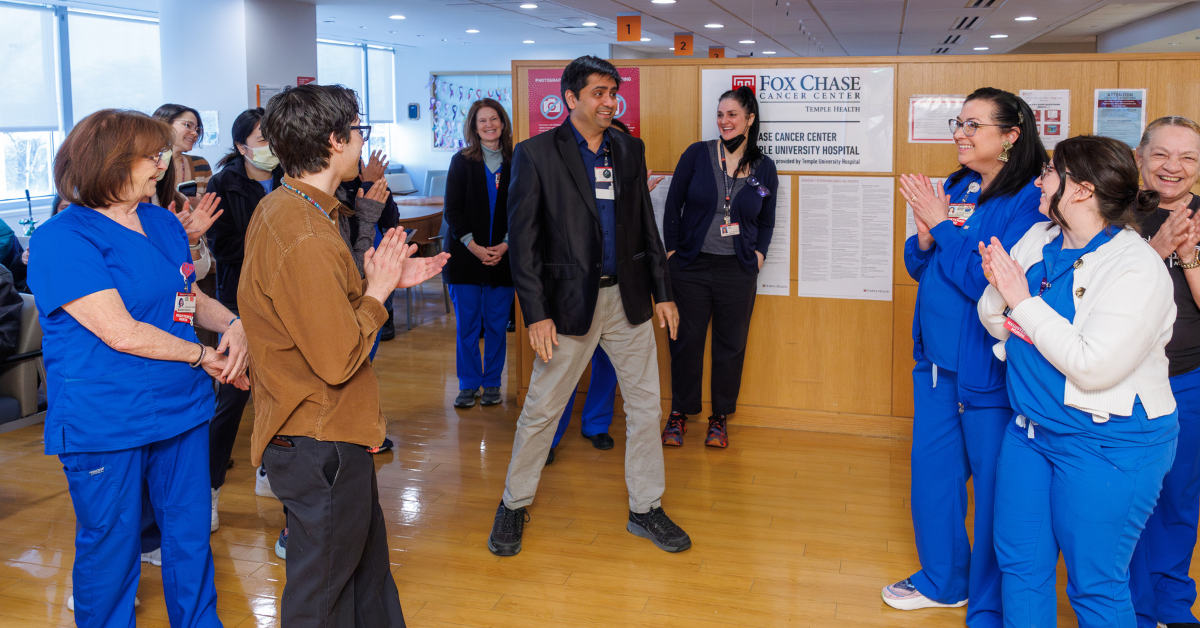
Rounds of applause and heartfelt remarks filled the room at Fox Chase Cancer Center at Temple University Hospital – Main Campus on February 20, 2025, as staff celebrated an infusion of support for patients being treated for lung cancer.
They were there to recognize Parth Desai, MBBS, MD, Assistant Professor in the Department of Hematology/Oncology, who was honored with the 2024 Innovation Award by Cheltenham, Pa.-based lung cancer nonprofit, Ride Hard Breathe Easy (RHBE). With a very personal mission, the group helps raise awareness and funds for patients with lung cancer.
“Mom died of lung cancer in 2011 and when she was sick, we saw a lot of the stuff that you deal with every day—the stigma, the survival rate, the lack of funding—and our family just said that we’re gonna do something,” said RHBE founder John Matthews. “We’ve had a chance to work with Fox Chase and work with Temple and other hospitals, and the main thing we want to do is help patients.”
Addressing Disparities and Removing Barriers to Care
The Innovation Award is presented annually to a researcher at one of the eight RHBE partner hospitals to fund a project that aligns with the organization’s mission and provides support for lung cancer patients. Those presented with the award receive $50,000 to develop their projects.
“My colleagues and I are extremely privileged to receive this honor,” said Desai. “This award means a lot because it will help us address disparities that we think will develop related to new developments in treatment for small-cell lung cancer.”
Desai received the award for his work with patients being treated with the recently approved small-cell lung cancer (SCLC) drug tarlatamab-dlle, also known by its brand name, Imdelltra. According to Desai, early data for this drug showed an impressive overall response rate of 40% and median overall survival of 12 months.
While the drug is effective, it has unique side effects, including a range of neurological symptoms and cytokine release syndrome (CRS), which causes exaggerated immune response. Once the drug is administered, patients require monitoring, which presents potential financial and logistical barriers for underserved populations.
The Importance of Philanthropy
“The Ride Hard Breathe Easy organization provides a tremendous amount of support to Temple and Fox Chase for our lung cancer patients,” noted Roxana Taveira, AVP, Oncology Services at Temple Health. “We are so grateful for their generosity, which elevates our patients’ overall experience by helping to remove barriers to care by providing transportation to appointments, help with food insecurity, and payments for utility bills. The Innovation Award, in particular, will support the specific needs of patients receiving newly available treatment for small-cell lung cancer.”
“Many of our patients come from far distances and overnight lodging is not always covered by insurance,” Desai explained. “While the Food and Drug Administration mandates monitoring for these patients 24 to 48 hours after receiving treatment, it does not specify that patients must be admitted to a hospital for this monitoring.
“We’re aiming to cover 24- to 48-hour hotel accommodations near Temple University Hospital’s campus for the patient and caregiver for the first few doses, because that’s when incidence of side effects is high. We are also looking to provide treatment discharge monitoring kits, guidance packets, and transportation assistance when needed,” he added.
Kits would include essential items needed for monitoring and early management of signs of CRS such as a thermometer, portable pulse oximeter, snacks, water, sleep mask, electrolyte drinks, and more. The kits would also include educational information on management of potential side effects and emergency phone numbers for on-call services.
Additionally, Desai and colleagues plan to establish a registry of SCLC patients undergoing treatment with tarlatamab-dlle. The registry will collect and profile blood and tissue samples and clinical history from medical charts. Researchers will use this data to develop prospective detailed adverse effect profiles, treatment response, and quality of life/behavioral surveys.
Since its establishment, Ride Hard Breathe Easy has raised $1 million for lung cancer research and support; bestowed three awards, including the Innovation Award bestowed upon Desai; and helped more than 2,500 patients.
“I am very honored to receive this award and look forward to developing new approaches to address these anticipated barriers to care for small-cell lung cancer patients,” Desai said.